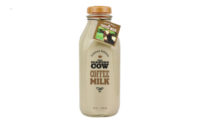
SACRAMENTO, Calif—The Dairy Council of California (DCC) recently researched how consumers respond to nutritional claims on food labels, specifically on dairy foods. DCC investigated what consumers look for on labels and whether label claims actually impact purchase.
“Using label claims has become an effective marketing tactic that many food industries have used to increase consumers’ knowledge of the health benefits of the product and to enhance product sales,” says DCC’s CEO Peggy Biltz. “There are a number of FDA-approved claims that could similarly be used on dairy product labels. With several known nutrients in dairy foods that provide health benefits, and various components under investigation for their possible benefits, the dairy industry has much to gain from increased use of these claims.”
Here are some highlights from DCC’s research:
What do consumers look for on labels?
- Consumers prefer labels that have positive health messages rather than disease-related statements. Using the phrase “optimizes bone health” is more effective than “prevents osteoporosis.” People prefer not to be reminded of a disease when purchasing and consuming foods.
- FDA-approved label claims, in general, lend credibility. Third-party endorsements such American Heart Association and National Osteoporosis Foundation further improve credibility and validity of nutrition claims on labels. A logo with such an endorsement serves as a fast, easily recognizable stamp of approval.
- Many consumers know that dairy products are a good source of calcium. A reminder may be useful, however, in light of the variety of foods that are now calcium-fortified.
- Most consumers are not aware of the numerous health benefits of consuming milk and dairy products beyond their calcium and bone health benefits. Emerging research linking dairy product consumption to reduced risk of colon and breast cancers, high blood pressure, obesity and other diseases will undoubtedly open up new labeling opportunities in the future for communicating these health benefits. (For more information on the benefits of dairy components, visit DCC’s website at www.dairycouncilofca.org.)
Do label claims really affect consumer purchasing and consumption decisions?
- DCC-sponsored research shows that consumers commonly use labels to increase their consumption of nutrients such as fiber and calcium.
- American Dietetic Association (ADA) research shows that 56% of American consumers switch to a different brand of the same item based on nutrition labeling.
- A 2002 ADA survey shows that 75% of consumers say they carefully select foods in order to achieve balanced nutrition and a healthful diet, and 58% says they actively seek information about nutrition and healthful eating.
- Nutrition is second only to taste as the main reason for food selections in the United States. Labels provide the consumer with point-of-purchase information on the product.
What are some actionable next steps by dairy processors? (There are many to consider. Here are a few.)
- Examine your product line. For each product, identify the possible claims (health, structure/function or nutrient content) that are warranted.
- Prioritize the claims for each product, considering the target customer, label space and desired outcome.
- Work with your labeling designer to experiment with different layouts and designs for adding a claim to existing labels.
- If space is an issue on product labels, consider other options for educating consumers about the health benefits of the product. Consumer education materials such as brochures, coupons, magazine advertisements or your company’s website offer alternative ways to disseminate information.
For a copy of the booklet that summarizes DCC’s consumer label research results and answers questions about the use of labeling claims, including the different types of claims and what type of approval or qualification is necessary in order to use them on product labels, call 916/263-3560.
In June 2003, MilkPEP will release a “Dictionary of Milk Claims.” This reference document will be a comprehensive listing of all allowable health claims and benefits of milk including regulatory and legal considerations for promotion and labeling. The document will also focus on a marketing framework associated with milk claims. Once completed, it will be sent to all milk processors, and made available by calling 800/945-MILK.




